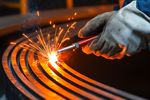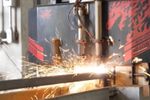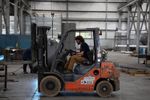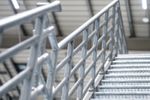For anyone charged with securing a custom metal industrial staircase for a warehouse, industrial facility, or other application, it can be extremely helpful to understand the language used in the fabrication of these metal stairs — both during the procurement and production phases. It is with that thought in mind that we decided to put together this glossary of industrial staircase terminology.
11 Critical Terms to Know When Talking About Industrial Stairs
- Handrail – This is a length of bar or piping that is usually supported from brackets on a wall. Generally continuous, this length of pipe or bar provides secure handhold support for those using the industrial staircase at a standard, comfortable height.
- Nose – The nose or nosing is the portion of the tread (see below) that projects beyond the face of the riser (see below) that is immediately below it. It serves as sort of a lip or edge for the tread of each step.
- Open Riser – You have an open riser when an industrial staircase is constructed without upright risers (see below) reaching from one step to another. An open riser is the open air space that results from this type of design and construction.
- Platform –A platform is an area that is larger than a step. Platforms are usually at the beginning or end of an industrial staircase — or they are used to break up an especially long run of stairs, giving workers a place to rest. Platforms are often used when a staircase changes direction.
- Railings– Railings serve as supports for handrails (see above) on exposed sides of staircases when wall brackets aren’t available. They also prevent people or materials from falling from an industrial staircase. Generally, vertical railings are topped with handrails (see above).
- Rise –The rise is the distance from the surface of a tread (see below) to the next higher tread. It is the minimum height a person would have to lift their foot to step up and continue climbing a staircase.
- Riser – This is the vertical member of a step that extends from the rear of a lower tread to near the front of edge of the tread above it. A riser can be solid or open depending on application and design.
- Stairs or Stairway – A stair or stairway is the series of steps that take users from one level to another. Industrial stairways can lead to a series of platforms, pits, or around equipment and machinery to provide access for maintenance or when machinery is in use.
- Tread – A tread is the horizontal, flat portion of a step’s surface that the bottom of the foot comes into contact with when stepping to the next level. It is critical that industrial stairway treads provide non-slip surfaces for safety.
- Tread Run – This is the flat surface, horizontal distance from the edge of one tread to the next one. In instances where a nose or nosing is used (see above), it would be the distance from the leading edge of a step’s nose to the leading edge of the nose of the step adjacent to it.
- Tread Width –This is the flat surface, horizontal distance from the front to the back of a tread. When nosing is used (see above), this distance is measured from the leading edge of the nose to the back of the tread,
Other Important Considerations When Specifying an Industrial Staircase
In virtually all instances where an industrial staircase might be needed, OSHA minimum standards and regulations for its construction will come into play. Regulations exist to regulate the height of railings and handrails, the height and width of risers and treads, and even how the treads are engineered to make sure they provide the necessary traction.
When you partner with a subcontractor to custom fabricate your industrial staircase, it’s important that they understand these regulations from the outset so they can work with you to facilitate the fabrication of a safe industrial staircase that achieves quick approval once installed.
This is just one of the multitude of reasons we encourage you to get a quote from a company like Southern Metal Fabricators, which has completed dozens of industrial staircases for multiple industries.
Our services include detailing, forming, assembling, and finishing for all the metal products we fabricate, including custom-made industrial staircases. So if you are in search of a subcontractor who can make your next set of industrial stairs, contact the custom metal fabrication company that can handle any size project. Ninety-nine point nine percent of the time, we’ll greet your request with a cheerful, no-nonsense “Yes, we can do that!”





